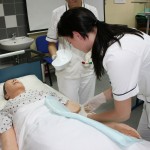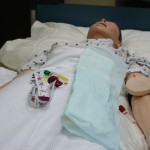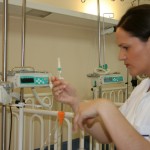Study curriculum | Accreditation [PDF]
Rationale
Based on the recommendations and standards set by World Health Organization and the European Union, professional and adequately educated nurses are needed in all health care levels.
Hence it becomes clear that the Croatian health care system needs nurses who have not only basic knowledge and skills of nursing care but also those who are highly educated and competent to perform management and other sophisticated functions.
General objectives of study program:
Preparing student to competently and skilfully perform the function of organisation and management in nursing on the basis of ethical principles, and directing them toward continuing education and follow-up of new achievements.
Enabling the students to perform the jobs concerning organisation and management of different places of work according to educational level. In order to achieve the highest standards of the profession, the knowledge about organisation and management should be developed through professional and scientific activities.
Enable the student for team work and collaboration with other professionals who are included in all forms of organisation and management in the health care system.
In order to be able to professionally develop through different forms of life-long education, the student should receive the highest level of education and integrated knowledge of theory and practice.
Specific objectives:
- to develop specific knowledge, skills and attitudes needed to work in the system of management and organisation in nursing.
- to develop knowledge, skills and attitudes that enable adequate assessment of the needs of a health institution or its specific segment, i.e. nursing, proper selection of the best developmental strategy, management, coordination and evaluation of health and nursing care in different situation and at different places of work.
- to develop knowledge, skills and attitudes needed to initiate changes in a community aimed at promotion of health and quality of nursing care.
- to develop the skill of critical analysis, synthesis and evaluation of jobs concerned with organisation and management.
- to develop the ability of decision making in or about the nursing care procedures in unpredicted circumstances.
- to develop the skill of recognising and defining complex problems and finding ways to solve them.
Current Experiences with Similar Programs
Basic nursing education in Europe and worldwide is a formally recognized study program that serves as a basis for general nursing practice, leadership role, and later training in special and more demanding areas of nursing and health care. The experiences of western countries show that nurses need additional knowledge that can be gained only in specialist studies, such as the study of management, public health, paediatric nursing care, nursing care of psychiatric patients, etc.
Specific needs of Croatian health care system are in the field of nursing management and organisation of nursing care as separate profession with competences in the implementation of nursing and health care activities. In the developed world today nurses participate in all management bodies of health care institutions; they are in charge of organisation, management and supervision of work of nurses. They also participate in all forms of development planning and strategic decision making.
Students’ Mobility
The program is open for admission of students from other similar university or college schools of post-secondary education that have study programs which are to a great extent compatible with the program taught at the University of Applied Health Studies (diploma supplement).
General information
Teaching Institution
University of Applied Health Studies
Name of the Study
Specialist Graduate Professional study of “Management in Nursing”
Duration
Two (2) academic years (4 semesters)
Admission Conditions
Fully completed three-year professional study of nursing; state board examination; knowledge of English and computer literacy; adequate professional experience is considered an advantage but is not a prerequisite.
Competences of Graduate Students, Job Skills and Opportunity for Continuing Education
Upon completion of curricular requirements the graduate students will be able to perform nursing practice in terms of its management and organisation as follows:
I They will gain knowledge about basic and specific forms of management process in health institutions and about crucial evolutionary trends in this sector.
II They will know how to apply principal methods and instruments in the management of health institutions.
III They will gain specific knowledge in the field of management in nursing.
The graduate students will know how to identify the problem and find ways to solve them within the management system of health organisation, or within a system composed of numerous different but integrated components: primary, secondary and tertiary health care, continuing medical care and nursing care at all health care levels. At the same time they will be able to understand organisational dynamics of health care system; they will gain knowledge that will enable them to study management efficacy in complex multi-professional organisational contexts and understand the complexity of managers’ quality in health institutions, with special reference to management processes in nursing.
Competences of Graduate Students
Professional competences in the field of management in nursing include the following groups of activities:
- Organisation, management and coordination of nursing care at micro and macro levels.
- Organisation, management and definition of health policy at micro and macro levels.
- Supervision and management of quantity and quality of nursing care.
- Promotion of professional competences at macro level.
- Assessment through data collection, analysis, interpretation and presentation.
- Nursing and health care planning / the standards of practice, processes and objectives.
- Implementation of nursing care
– carrying out of basic and special care /organisation, management, control and evaluation
– carrying out of nursing care interventions / algorithms oforganisation, management, control and evaluation
– care about environment. - Reporting and documentation about the provided nursing care at micro and macro levels.
- Promotion of health and health education.
(WHO Declaration, Munich, 2000)
Job Skills
Upon graduation the nursing professional will be capable to perform all the above stated competences.
Opportunity for Continuing Education
The graduates will be able to continue their education in other institutions of higher education in biomedicine, the programs of which are to a great extent compatible with the completed study program in the country or abroad (diploma supplement), and according to legal acts (for doctoral degree).
Professional Title
M.A. in nursing









